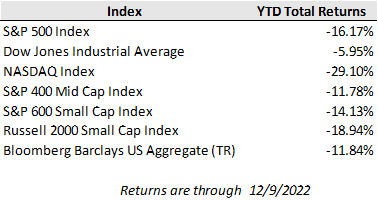U.S. equity markets slumped lower to close out the worst weekly performance since late September as recession fears resurfaced after producer price inflation came in hotter than expected on Friday. Gloomy economic outlooks from major banks and research firms along with recession forecasts from top CEOs also weighed on sentiment. For the week, the S&P 500 slipped by 3.37%, and all eleven economic sectors were in the red. Energy was the top loser, as oil slumped on supply concerns after an outage at a key North American pipeline. Defensive sectors utilities, health care and consumer staples fell the least.
However, Friday’s inflation concerns were short-lived as both stock and bond markets are rallying sharply in this week’s early trading driven by this morning’s release of the November Consumer Price Index report, which came in lower than expected and confirmed the continued trend in easing consumer price pressures. Headline CPI growth eased to 7.1% year-over-year, compared to the consensus forecast of 7.3%, as energy prices continued to slide lower last month. Core CPI (excluding food & energy) posted the lowest month-over-month growth of 0.2% since August of 2021, bringing the year-over-year core price growth to 6.0% from 6.3% in October. Goods prices continued to decline during the month and offset sticky core service price increases, but there was also some cooling in services. Airline fares fell 3% in November for a second consecutive monthly decline with help from falling energy prices. Bond yields are tumbling in response to the report to reflect lower rate hike expectations with the 2-year Treasury falling to 4.16% at the time of this writing from 4.40% yesterday.
Meanwhile, last week’s other economic data generally came in strong, increasing hopes a potential soft-landing where inflation decelerates while economic growth slows but remains positive. The November ISM services PMI index, a key gauge of strength in the services sector, ticked unexpectedly higher. October factory orders also climbed past estimates, while labor productivity rose more-than-expected. In contrast, the labor market seemed to show some hints of cooling, with continuing jobless claims surging past the consensus. The University of Michigan's reading on consumer sentiment was better-than-anticipated, while short-term inflation expectations improved.
With the CPI reading behind, investors are shifting their attention to the meeting of the Fed's monetary policy committee - its last one of this year - which is kicking off today. Equity markets may have the wind at their back into the close of the year following today’s inflation report, but Fed Chair Jerome Powell's comments at the press conference on Wednesday will be important in whether or not the so called “Santa Claus rally” can continue to gain steam. The downside inflation surprise has bolstered expectations for the Fed to decelerate rate hikes and deliver a 0.50% rate hike at this meeting.
While recent readings from the labor market continue to be strong, the housing slowdown appears to be spreading into manufacturing and given economists differing opinions on how high interest rates will go. Looking ahead, trading on the federal funds futures contract indicates almost an even split between a 25-point or 50-point interest rate increase at the February meeting. Bank of America thinks Chairman Jerome Powell is likely to push back once more against the idea of a dovish pivot. Powell could reiterate his comments from a speech last week when he noted wage inflation plays a large role in core services inflation ex-housing and the only way to bring inflation back towards the target rate is to slow down the labor market.
The rise and fall of Sam Bankman-Fried, the founder of the failed crypto exchange FTX, came full circle yesterday, with his arrest in the Bahamas at the request of U.S. authorities, followed by the S.E.C. filing its own charges this morning. NYT.com reports that federal prosecutors in Manhattan, who are seeking his extradition, will charge Bankman-Fried with wire fraud, wire fraud conspiracy, securities fraud, securities fraud conspiracy and money laundering. A trial could start late next year.


